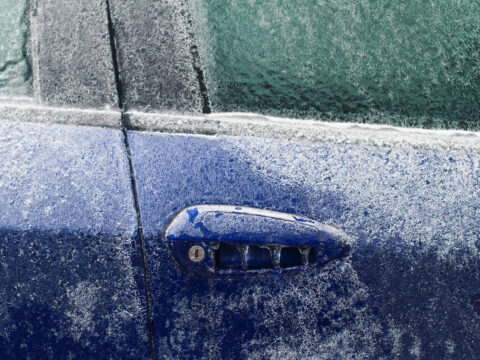All diesel vehicles are susceptible to difficult starts when the weather is cold, so don’t worry! To fire diesel fuel successfully, higher temperatures are required than that of gasoline cars.

Although unavoidable, how do you fix diesel engine difficulties once they start during the winter months? In this article, we’ll examine the main reasons why this issue occurs and top tips for how to get your diesel engine working when it’s cold.
Contents
Do diesel engine cars struggle to start in cold?
Yes, all diesel engines are more difficult to start in the winter than in the summer and much harder than gasoline engines. If you’re struggling to start your diesel engine before you start troubleshooting the different components of your car’s interior, you should check the temperature – it may simply be the cold weather that’s causing your car troubles.
Cold start diesel problems
If the temperature is cold enough, your diesel could experience all kinds of start problems. Firstly, the cold weather could thicken – or ‘gel’ – the diesel fuel. The fuel thickens because the fuel molecules are forced to move more slowly. What does this mean in terms of start problems? Thickened diesel fuel is a lot harder to ignite.
Secondly, given that diesel engines don’t feature spark plugs, it can be doubly hard to ignite the gelled fuel. So, you’ve got to give your glow plugs a sufficient amount of time in order to combust the fuel. This adds to your wait time.
In what temperatures do diesel cars not start?
As soon as the temperature drops slightly, you may find yourself experiencing start issues with your diesel car – particularly when it comes to older models! However, as a rule of thumb, diesel engine issues tend to most commonly start when the temperature drops below 32 degrees Fahrenheit (the freezing temperature).
At this temperature, the fuel will start to thicken, and the fuel tank will start to cloud. Although it is unlikely to completely prevent you from driving, it is at this point that problems start to occur for diesel drivers.
If the temperature drops below 15 degrees, you’ll likely experience some degree of engine starting difficulties. In climates below 9 degrees, most diesel vehicles will stop working completely.
What causes hard starting in diesel cars when cold?
To examine more closely why diesel engines are more difficult to start in cold weather, here are the top 3 causes of difficult diesel starts in winter:
Thickened diesel fuel
As already mentioned, diesel fuel will start encountering problems around the freezing mark (32 degrees Fahrenheit). For the fuel to be usable again, you’ll need to let your glow plugs heat up.
If, after waiting 15 seconds for these plugs to heat up, the diesel fuel remains gelled, then you probably need new glow plugs! However, this could be merely caused by a build-up of carbon around the glow plugs. In which case, they just need cleaned and not totally replaced.
The vehicle’s battery power is low
If you do not have sufficient power in your car battery, your car cannot perform the tasks it needs to do to start when cold. For example, in order for the glow plugs to heat up, they need a significant amount of battery power.
However, it’s important to note that a battery cannot sustain charge as easily when the temperatures drop. Once the temperature drops below freezing, a battery charged at 100% can only provide half of its power. For this reason, many car owners install a second battery in order to ensure sufficient power can be supplied.
Several issues at once
In addition to battery troubles and thickened diesel fuel, there is a number of issues you can encounter during the winter that you won’t encounter during the warmer months.
This includes injectors failing to atomize, diesel failing to combust correctly, thickened engine oil, issues with fuel lines, cranking resistance, and a build-up of carbon, amongst many other issues!

What do you do if your diesel won’t start in the cold?
In order to overcome the issues mentioned above, carry out the following actions in order to get your diesel vehicle working in the winter:
Turn off non-essentials
As we’ve already mentioned, your battery operates on reduced power when cold – even if it’s a fully charged battery, it cannot provide full charge the same way it can in warmer climates.
For this reason, it’s a good idea to turn off any non-essential car functions, such as air conditioners, heaters, radios, headlights, etc., when you are trying to start the engine. In order for the glow plugs to sufficiently heat up, they require all the energy they can pull from the battery.
Keep the engine warm
In order to speed up warm-up times in the morning, it would be a good idea to keep your engine in a warm place overnight. This could be done simply by keeping your car in a garage overnight. Alternatively, you can use a block heater in order to get your engine warm before starting the car.
Having a block heater handy is a good way to overcome unforeseen starting difficulties during the winter.
Change the fuel filter
In addition to using a block heater, you should change the fuel filter if you suspect that the fuel has gelled. Once the block heater has sufficiently warmed the engine, switch over the fuel filter in order to avoid clogging between the fuel tank and the injector pump.
Change oil periodically
If you’re having difficulty starting your car in winter, you should get in the habit of changing the oil more frequently than you would any other time of the year.
The lubricating oil in your diesel engine also thickens when temperatures are cold, so it’s important to change this oil as regularly as you can. When thickened, the oil cannot lubricate as easily, as the moving parts of the engine block can put up more resistance.
In order to keep your diesel engine running smoothly throughout the winter, you need to refill it with either natural or synthetic mineral oils.
How long should you let your diesel truck warm up in winter?
Giving your diesel fuel system enough time to warm up in the winter could be all it takes to get it working. Ideally, you should be giving your hydraulic oil at least 5 minutes to warm up prior to trying to start the engine.
Although 5 minutes tends to be the standard recommended time, some car enthusiasts might disagree. With an older diesel engine, it may take as long as 10 minutes for the car to sufficiently heat up – particularly in the extreme cold.
On the other hand, car experts warn against letting new diesel vehicles run idle for longer than 3 minutes. So, it can be difficult to establish a general rule for how long you should let your car warm up, as all diesel vehicles are different.
Is diesel or gas better for cold weather?
Gasoline is the better option for cold weather as it does not freeze up, unlike diesel. Not only does it not freeze, but it also vaporizes far easier at low temperatures than diesel. Therefore, if you stay in a cold climate, a gas vehicle may be the better option for you.
Recommended winter diesel additives
Our recommended winter diesel fuel additives include Howes Diesel Treat and Hot Shot’s Secret Diesel Extreme.
If you’d like to reduce the risk of your diesel fuel gelling, then you should invest in some good-quality winter diesel additives. These fuel additives can be added while you fuel and should be added when the outdoor temperature is at its warmest in order to successfully mix with your fuel.














